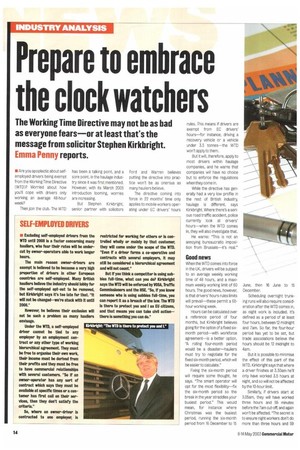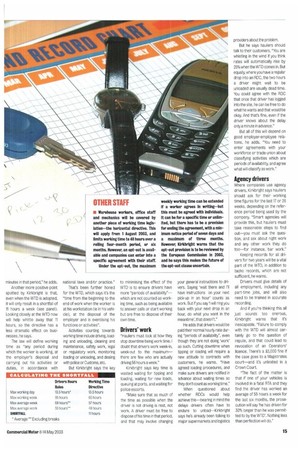Prepare to embrace the clock watchers
Page 14

Page 15

If you've noticed an error in this article please click here to report it so we can fix it.
The Working Time Directive may not be as bad as everyone fears—or at least that's the message from solicitor Stephen Kirkbright. Emma Penny reports.
• Are you apoplectic about selfemployed drivers being exempt from the Working Time Directive (WTD)? Worried about how you'll cope with drivers only working an average 48-hour week?
Then join the club. The WTD has been a talkng point, and a sore point, in the haulage industry since it was first mentioned. However, with its March 2005 introduction looming, worries are increasing.
But Stephen Kirkbright, senior partner with solicitors Ford and Warren believes putting the directive into practice won't be as onerous as many hauliers believe.
The directive coming into force in 22 months' time only applies to mobile workers operating under EC drivers' hours
rules. This means if drivers are exempt from EC drivers' hours—for instance, driving a recovery vehicle or a vehicle under 3.5 tonnes—the WTD won't apply to them.
But it will, therefore, apply to most drivers within haulage companies, and he warns that companies will have no choice but to enforce the regulations when they come in.
While the directive has generally had a very low profile in the rest of British industry, haulage is different, says Kirkbright. Where there's a serious road traffic accident, police currently look at drivers' hours—when the WTD comes in, they will also investigate that.
He warns: "This is not an annoying bureaucratic imposition from Brussels—it's real."
Good news When the WTD comes into force in the UK, drivers will be subject to an average weekly working time of 48 hours, and a maximum weekly working limit of 60 hours. The good news, however. is that drivers' hours rules limits will prevail—these permit a 65hour working week.
Hours can be calculated over a reference period of four months, but Kirkbright believes going for the option of a fixed sixmonth period—with workforce agreement—is a better option. 'A rolling four-month period would be a disaster—hauliers must try to negotiate for the fixed six-month period, which will be easier to calculate."
Fixing the six-month period will require some thought, he says. "The smart operator will opt for the most flexibility—fix the six-month period so the break in the year straddles your busiest period." This would mean, for instance where Christmas was the busiest period, running the six-month period from 16 December to 15 June, then 16 June to 15 December.
Scheduling overnight trunking runs will also require consideration after the WTD comes in, as night work is included. It's defined as a period of at least four hours, between 12 midnight and 7am. So far, the four-hour period has yet to be set, but trade associations believe the hours should be 12 midnight to 4am.
But it is possible to minimise the effect of this part of the WTD. Kirkbright says that where a driver finishes at 3.30am he'll only have worked 3.5 hours at night, and so will not be affected by the 10-hour limit.
Similarly, if drivers start at 3.05am, they will have worked three hours and 55 minutes before the 7am cut-off, and again won't be affected. "The secret is to ensure night workers don't do more than three hours and 59 minutes in that period," he adds.
Another more positive point spotted by Kirkbright is that, even when the WTD is adopted, it will only result in a shortfall of 11 hours a week (see panel). Looking closely at the WTD now will help whittle away that 11 hours, so the directive has a less dramatic effect on businesses, he says.
The law will define working time as any period during which the worker is working, at the employer's disposal and carrying out his activities or duties, in accordance with national laws and/or practice."
That's been further honed for the WTD, which says it's the "time from the beginning to the end of work when the worker is at his workstation (le in his vehicle), at the disposal of the employer and is exercising his functions or activities".
Activities counting towards working time include driving, loading and unloading, cleaning and maintenance, safety work, legal or regulatory work, monitoring loading or unloading, and dealing with police or Customs, etc.
But Kirkbright says the key to minimising the effect of the WTD is to ensure drivers have more "periods of availability"— which are not counted as working time, such as being available to answer calls or start working but are free to dispose of their own time.
Drivers work
"Hauliers must look at how they stop downtime being work time. I doubt that drivers work week-in, week-out to the maximum— there are few who are actually driving 56 hours a week."
Kirkbright says key time is wasted waiting for tipping and loading, waiting for new loads, queuing at ports, and waiting for police escorts.
"Make sure that as much of the time as possible when the driver is not driving is rest, not work. A driver must be free to dispose of his time in that period, and that may involve changing
your general instructions to drivers. Saying 'wait there and I'll have instructions on your next pick-up in an hour' counts as work. But if you say 'I will ring you back with your next drop in an hour, do what you want in the meantime', that doesn't."
He adds that drivers would be paid their normal hourly rate during "periods of availability", even though they are not doing 'work' as such. Cutting downtime when tipping or loading will require a new attitude to contracts with customers, he warns. "Have agreed loading procedures, and make sure drivers are notified in advance about waiting times so they don't count as working time."
When questioned about whether RDCs would help achieve this—bearing in mind the delays drivers often have to endure to unload—Kirkbright says he's already been talking to major supermarkets and logistics providers about the problem.
But he says hauliers should talk to their customers. "You are whistling in the wind if you think rates will automatically rise by 25% when the WTD comes in. But equally, where you have a regular drop into an RDC, the two hours a driver might wait to be unloaded are usually dead time. You could agree with the ROC that once that driver has logged into the site, he can be free to do what he wants and that would be okay. And that's fine, even if the driver knows about the delay only a minute in advance."
But all of this will depend on good employer-employee relations, he adds. "You need to enter agreements with your workforce or trade union about classifying activities which are periods of availability, and agree what will classify as work."
Agency drivers
Where companies use agency drivers, Kirkbright says hauliers should ask for their working time figures for the last 17 or 26 weeks, depending on the reference period being used by the company. "Smart agencies will provide this, but hauliers must take reasonable steps to find out—you must ask the question, and ask about night work and any other work they do too—for instance, bar work."
Keeping records for all drivers for two years will be a vital part of the WTD, in addition to tacho records, which are not sufficient, he warns.
Drivers must give details of all employment, including any part-time jobs, and will also need to be trained in accurate recording.
And if you're thinking this all Just sounds too onerous, Kirkbright warns that it's inescapable. "Failure to comply with the WTD will almost certainly go to the question of repute, and that could lead to revocation of an Operators' licence. There's a £5,000 fine if the case goes to a Magistrates court—and it's unlimited in a Crown Court.
"The fact of the matter is that if one of your vehicles is involved in a fatal RTA and they find the driver has worked an average of 55 hours a week for the last six months, the prosecution will say 'he has driven for 30% longer than he was permitted to by the WTD'. Nothing less than perfection will do."
































































































































































